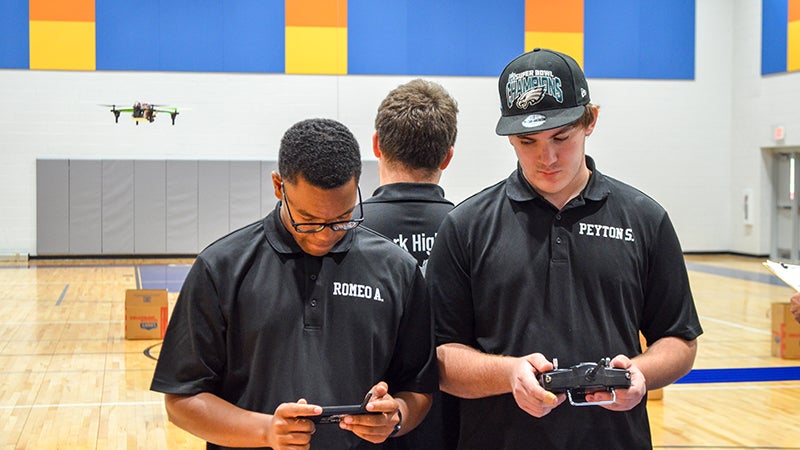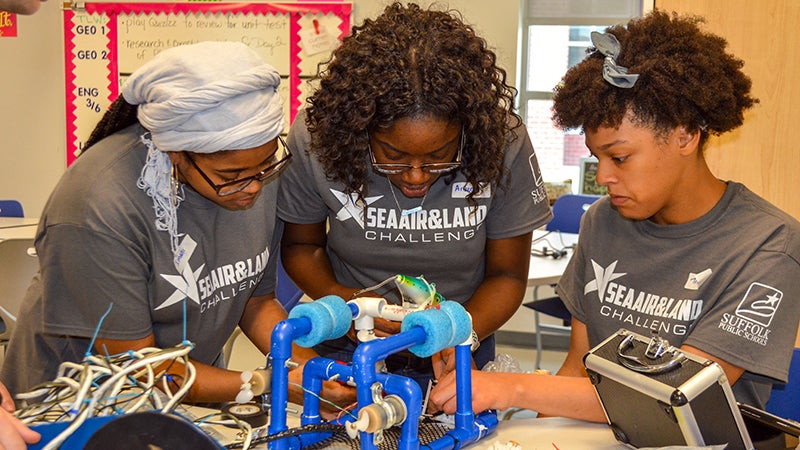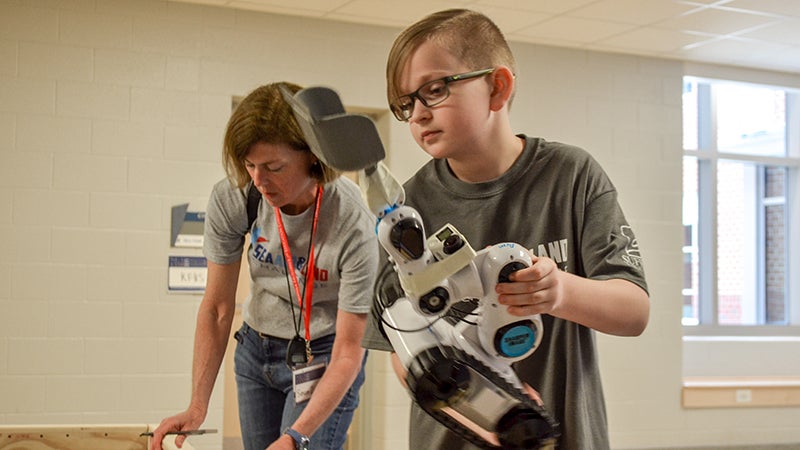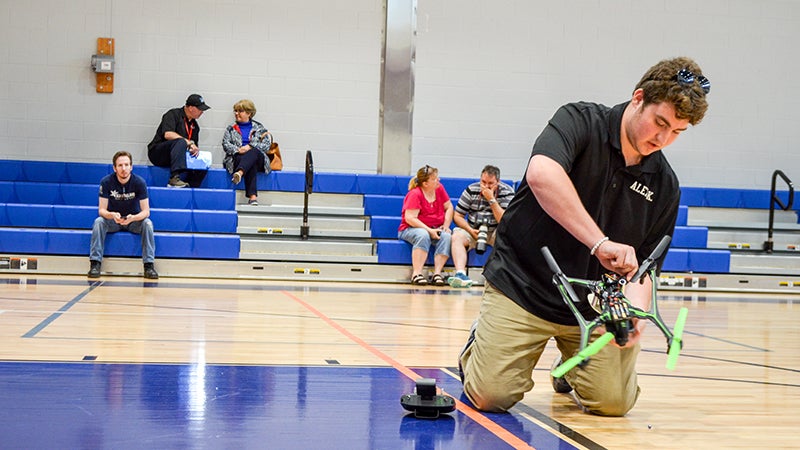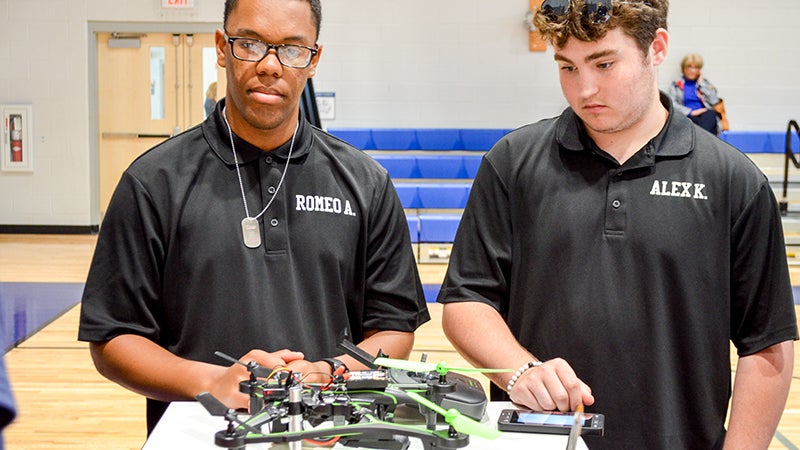Challenging robots, even better teamwork
Published 10:33 pm Tuesday, May 14, 2019
Teams of young, critical thinkers worked together last weekend to overcome obstacles in the second annual Sea, Air and Land Challenge held in Suffolk.
Nicknamed the SeAL Challenge, the competition was held on Saturday at Col. Fred Cherry Middle School. There were 14 robotics teams competing in this year’s event, including five Suffolk high schools and middle schools.
Developed by the Penn State Electro-Optics Center and sponsored by the Office of Naval Research, the SeAL Challenge offers three unique engineering challenges for middle and high schoolers — one underwater, another in the air and the third on the ground.
The teams designed, developed and built unmanned vehicles and customized payloads for these challenges, which were based on scenarios faced by military personnel and first responders. Virginia State Police was also at the school on Saturday to demonstrate different tactical robots.
“Students are designing and building robotic systems that can perform maneuvers similar to those that first responders or the military might use in their operations,” said Christine Lafferty, Suffolk Public Schools manager of information services and regional coordinator for the SeAL challenge.
Virginia is the third state to host this event, alongside Pennsylvania and Ohio. This year’s competition brought out the best from Lakeland and King’s Fork high schools, plus John F. Kennedy, Forest Glen and Col. Fred Cherry middle schools.
Norfolk Technical Center also fielded a team on Saturday, as well as Booker High School from Sarasota, Fla. The all-ladies Florida squad came to Virginia to both win a trophy and bring the challenge to their home state.
“As I look out at all of you, I couldn’t be more excited,” U.S. Navy Lt. Commander William Corrigan said during his opening remarks on Saturday. “I couldn’t be more optimistic about what the future of America holds and the direction that we’re going, and that’s all because of you. Our future inventors, our future scientists and our future leaders.”
All of the teams attempted their respective challenges twice on Saturday — first in the morning and again in the afternoon.
Sea challenge teams gathered at a water-filled tank in the bus ramp at the middle school. In the water were boxes that represented “drop zones.” Students designed and built remote-operated vehicles to find objects in the tank, retrieve them and put their “payloads” in specific drop zones.
But the pilots didn’t simply look at their robots. This test required teams to use camera equipment to observe their unmanned vehicles.
“Students have designed and built a remote-operated vehicle (and) they use a camera — or a backup camera from a pick-and-pull wrecked car — to operate that vehicle without watching it,” Lafferty said.
Students didn’t have direct line-of-sight in the land challenge, either. Pilots sat with their backs to the wood-framed box that their robots rolled around in, identified objects of interest and deposited them in the judge’s designated location.
This challenge required intense teamwork when it came to flying quadcopters inside the gym for the air challenge. Each team had a pilot to fly their copter while a teammate gave directions through carefully placed cameras.
“They also are supposed to be able to carry a payload and drop that payload in a specific location and hit a target,” Lafferty said.
The KFHS Mechatronics team had to recalibrate their approach after their first quadcopter attempt in the morning, but thanks to some great piloting, they were able to get at least one payload into the target in just under a few minutes.
“We’re going to adjust the cameras so that we can have a more accurate view, and also calibrate the drone more so that we won’t have as much tilting,” KFHS junior Bradley Harrison, 16, said during their lunchtime calibrations on Saturday.
The winning middle school sea team for this year’s SeAL Challenge was Col. Fred Cherry Middle School’s “Ospreys,” and Forest Glen Middle School had the winning land team, which was dubbed “1 if by Land, 2 if by Sea.” There was no middle school air team at this year’s competition.
The “Norfolk Raiders” of Norfolk Technical Center had the winning high school teams for both land and sea, and the Mechatronics of KFHS won in the air. Booker High School’s “Legacy” team also won for best innovation in the sea challenge.
“I have seniors that are leaving,” said KFHS Robotics Coach Todd Gidley, “and they’re going to celebrate this win on the way to college, and that’s huge.”
But Gidley was also quick to give credit to their surprising benefactors during the team’s darkest hour on Saturday.
Around lunchtime, the KFHS air team realized they didn’t have a charger for their second battery. Without that battery, they couldn’t complete their second flight.
Debra Shapiro, the FGMS technology and engineering education teacher and Gidley’s mentor, put him in touch with Richard Dyer, engineering technology instructor for the “Norfolk Raiders.”
Dyer didn’t hesitate. He immediately gave Gidley’s team a charger — but then the Mechatronics discovered a half-hour later that their second battery had a bad cell and was unusable.
Dyer and his team stepped up once again to give Gidley’s students a brand-new battery that they spliced and soldered to connect with the KFHS drone.
He could have just said no. Instead, Dyer helped KFHS soar on Saturday, and all he asked for in return was for Gidley’s team to provide flight time and instruction to his own students.
“My guys are going to drive over one afternoon and invest an hour in flight time to teach his guys, and we’re going to see his shop,” Gidley said. “I’m just excited about both schools working together in the future.”
This seemed to just be standard practice for robotics teams like Dyer’s “Raiders.” That same day, they donated a drone frame, motor and propellers to Shapiro’s FGMS team to help get them started on their air team next year.
“I’ve been competing in robotics for about 18 years, and one of the things I try to teach my students is that it’s not about you winning,” Dyer said. “It’s about what you learned in working with other people, helping them out, making them better.”


